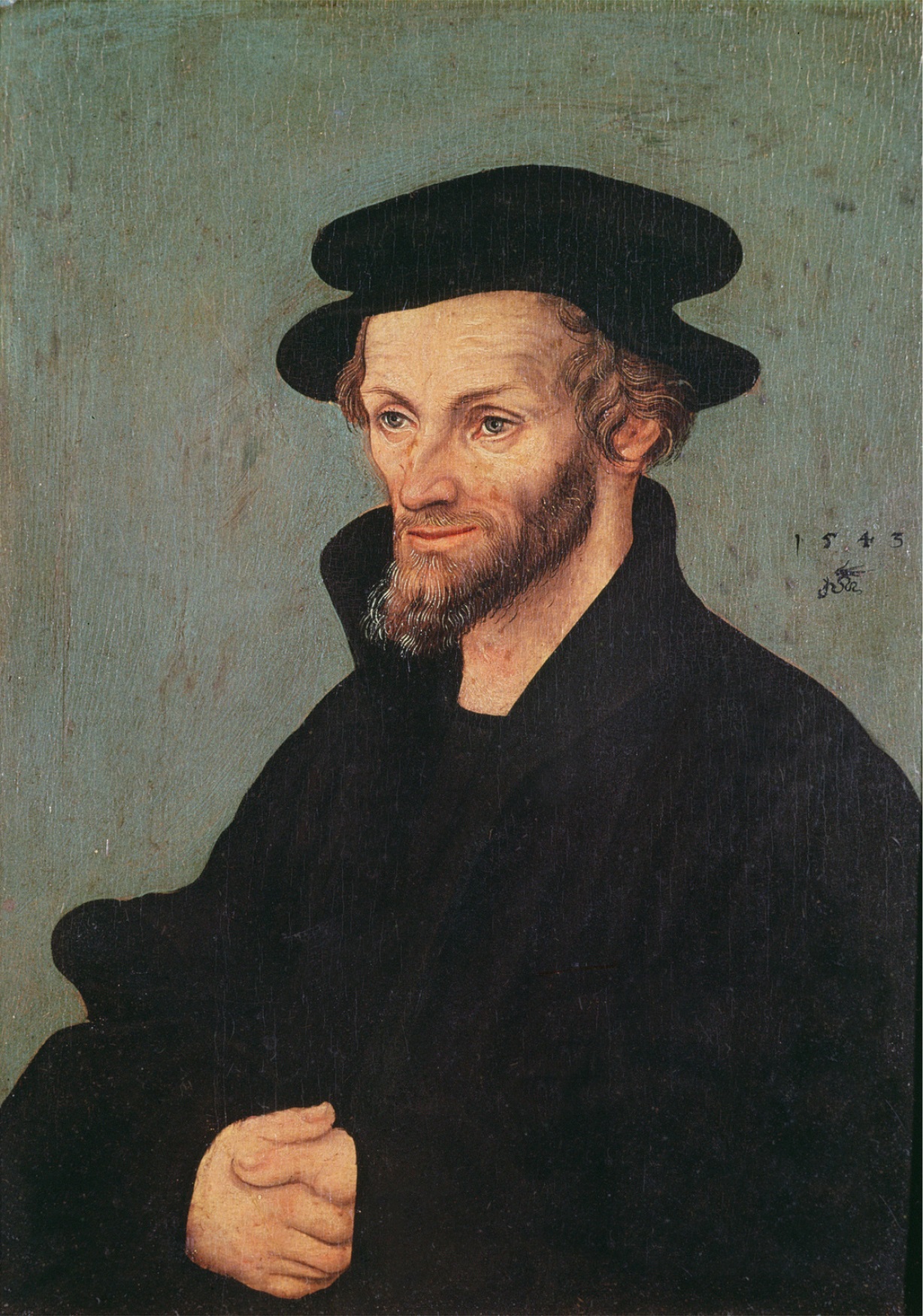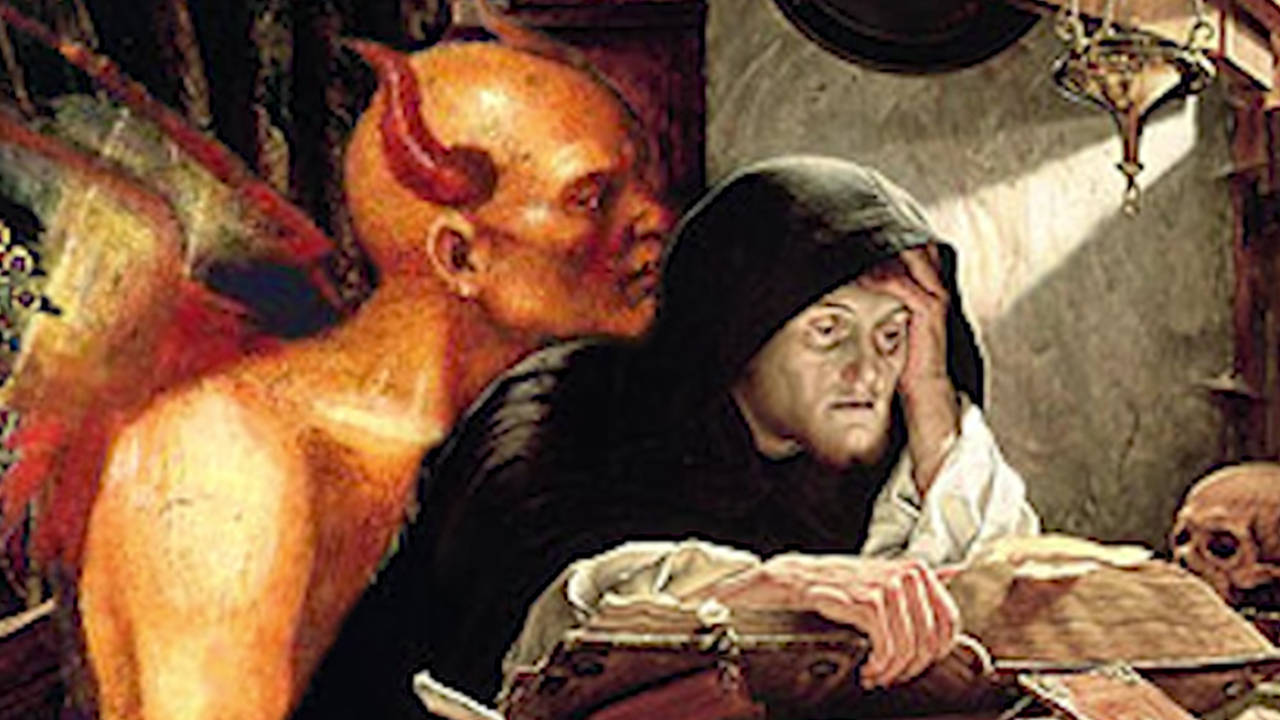Delirium and fanaticism are in Protestantism as in their natural element.
We could, to prove it, fill large volumes. I limit myself to a quick overview, based on the simple testimony of the facts.
Luther argues with the devil
I start with Luther. Is there any greater folly in the world than to claim to have been taught by the Devil , to boast of it and to establish a new doctrine on this mighty authority? Yet this is what the founder of Protestantism, Luther himself, did, who recorded in his works the testimony of his interview with Satan.
Whether the apparition was real or whether it haunted dreams of a feverish night, it is impossible to carry fanaticism further than to boast of having had such a master .
Luther himself tells us that he had several conferences with the Devil . The most remarkable thing is this vision, which he recounts very seriously, in which Satan urged him to argue against the Mass which the priests celebrate without assistance. Luther vividly describes this adventure for us. He wakes up in the middle of the night, Satan appears to him. Luther is horrified. He is sweating, he is shaking, his heart is beating horribly. The discussion begins, however. The Devil shows himself to be such a good dialectician that Luther remains defeated , unanswered. The Devil's logic was accompanied by a voice so frightening that poor Luther's blood froze in his veins:
"I understood then," he said, "how it often happens that people die at the break of day: it is because the Demon can kill or suffocate men and, without going that far, he puts them on, when he argues against them. them, in such embarrassment that he can thus cause their death: this is what I have often experienced myself. "
This passage is certainly curious.
Zwingli helped by a ghost
Another extravaganza: the ghost that appears to Zwingli , founder of Protestantism in Switzerland. This heresiarch wanted to deny the real presence of Jesus Christ in the Eucharist. He claimed that the consecrated bread and wine are nothing more than a sign of the body and blood of Christ. He was, however, embarrassed by the authority of the sacred text, which clearly expresses the contrary. And suddenly, just as he was imagining a discussion with the town secretary, a white or black ghost , as he himself said, appeared to him, and brought him the desired explanation .
This beautiful story comes to us from Zwingli himself.
Mélanchton's Superstitions

Mélanchton is strangely credulous with regard to dreams, extraordinary phenomena and astrological forecasts. His letters are full of them. At the time of the Diet of Augsburg, Melanchton regarded as favorable omens to the new Gospel a flood of the Tiber, the birth of a monstrous mule with a crane's foot , in Rome, and that of a two-headed calf in the Augsburg territory. These events are for him the unmistakable announcement of the coming ruin of Rome and of the triumph of Protestantism . He writes all this seriously to Luther.
He himself draws his daughter's horoscope , and he trembles for her, because Mars looks terrible. He is also terrified by the flame of a comet appearing at the limits of the north. Astrologers had predicted that in autumn the stars would be more favorable to ecclesiastical disputes; this prognosis is enough to console him for the slowness of the Augsburg conferences; his friends, leaders of the Protestant party, let themselves be dominated by the same powerful reasons.
Melanchton is predicted to be shipwrecked in the Baltic; he is careful not to embark there. Certain Franciscans had taken it upon themselves to prophesy that the power of the Pope was going to disappear; the monk added that in the year 1600 the Turk would become master of Italy and Germany : Melanchton boasted of having in his possession the original prophecy; moreover, the earthquakes which occur confirm this in his belief.
Anabaptism fanaticism
Refusing the authority of the Church, the human spirit sets itself up as the sole judge of faith. Immediately, Germany is flooded with blood. Mathias Harlem , Protestant Anabaptist, takes the head of a ferocious troop, orders to sack the churches, to tear down the sacred ornaments, to burn as impious or useless all the books, with the exception of the Bible.
Established in Munster, which he called the Mountain of Sion , he had all the gold, all the silver and the precious stones that the inhabitants possessed before him. He deposits them in a common treasury, and appoints deacons to distribute them. All his disciples are obliged to eat together, to live in perfect equality and to prepare for the war they will have to undertake, for they will have, he says, to leave Mount Zion, to subdue all the nations of the land in its power . He dies in a reckless attempt, wanting, like Gideon , to exterminate an entire army with a handful of men.
The delusions of Jean de Leyde
Bécold , better known under the name of Jean de Leyde , is the heir of Mathias' fanaticism. Tailor by trade, he starts running naked in the streets of Munster, shouting: Here comes the King of Zion! He enters his house, locks himself there for three days. When we come to inquire about him, he pretends not to be able to speak. Like a new Zechariah, he asks by signs what to write. He writes as he received a revelation from God : the people, in imitation of the people of Israel, must be governed by judges. He appoints twelve judges, choosing the men who are most attached to him. He then withdraws cautiously, leaving these new magistrates to seize the city. When their power is recognized, his authority as a new prophet is assured; But that is not enough for him ; he wants to be surrounded by pomp and majesty, by having himself proclaimed king. The fanaticism of its supporters is so blind that it easily succeeds. He gets along with a goldsmith and introduces him to the art of prophesying. He appears before the judges of Israel and declares to them:
This is what the Lord God God wills: As in other times I set Saul over Israel, and after him David, who was but a shepherd, so I am appointing today hui my prophet, Becold king of Sion.
The judges refuse to abdicate. Bécold announces to them when he had the same vision. He hid it out of humility, but God having spoken through another prophet, he must resign himself to ascending to the throne, and carrying out the orders of the Most High. The judges are hardly convinced. The people are summoned to the Market Square. There, a " prophet" presents Bécold, on behalf of God, with a drawn sword: it symbolizes the power of justice which is conferred on him over all the earth, to extend the empire of Zion to the four corners of the world. He was proclaimed king and solemnly crowned on June 24, 1534.
Bécold had married the wife of his predecessor. He elevates her to royal dignity and reserves for her the privilege of queen, but at the same time he has up to seventeen wives , to conform to the holy liberty which he has proclaimed in this matter. His sixteen months of reign will be nothing but a chain of crimes, orgies, assassinations, atrocities and delusions of all kinds .
Catholics denounce these horrors. Protestants also complain. But whose fault is it? Who then rejected the authority of the Church and delivered the Bible to the populace , turning their heads and throwing them into these criminal follies? The Anabaptists themselves see this very clearly. When Luther condemns them, they are seized with a violent indignation. By what right does the one who established the principle want to stop its consequences?
Luther, finding in the Bible that the Pope was the Antichrist, assumed the mission of destroying his authority. He urged everyone to unite against him. Why could the Anabaptists not in their turn receive from God the order to exterminate all the ungodly in order to establish a new kingdom in which only the pious men, who had become masters of all things, would subsist?
Protestant madness epidemic
Herman preaches the slaughter of all priests and magistrates in the world. - David George claims to bring a perfect doctrine, because that of the Old and New Testaments was imperfect: he is the true son of God. - Nicolas rejects faith and worship as useless; he also demolishes morality by teaching that it is good to persevere in sin so that grace may abound. - Hacket claims that the spirit of the Messiah descended on him; he sends two of his disciples to cry through the streets of London: Here comes Christ from this side, a vase in his hand!
All these deplorable spectacles, a hundred others that I could recall, do they not clearly prove that the Protestant system nourishes and revives a terrible fanaticism ?
Venner, Fox, William Sympson, J. Naylor, Count Zinzendorf, Wesley, Baron of Swedenborg, and other similar names suffice to recall a group of sects so extravagant and a series of crimes such that there would be something to say about it. write volumes.
I have not made any fiction, I am not exaggerating; open the story, consult the authors, I do not say only Catholics, but Protestants or whoever they are: you will find everywhere a multitude of witnesses who testify of the truth of these facts; noisy facts that happened in the light of the sun, in great capitals, in times that almost touch our own.
And that we do not believe that this source of illusion and fanaticism has been exhausted by the course of the centuries. It does not seem that it is close to drying up ...
after Jacques Balmès ,
Protestantism compared to Catholicism (1844), ch. 7.


